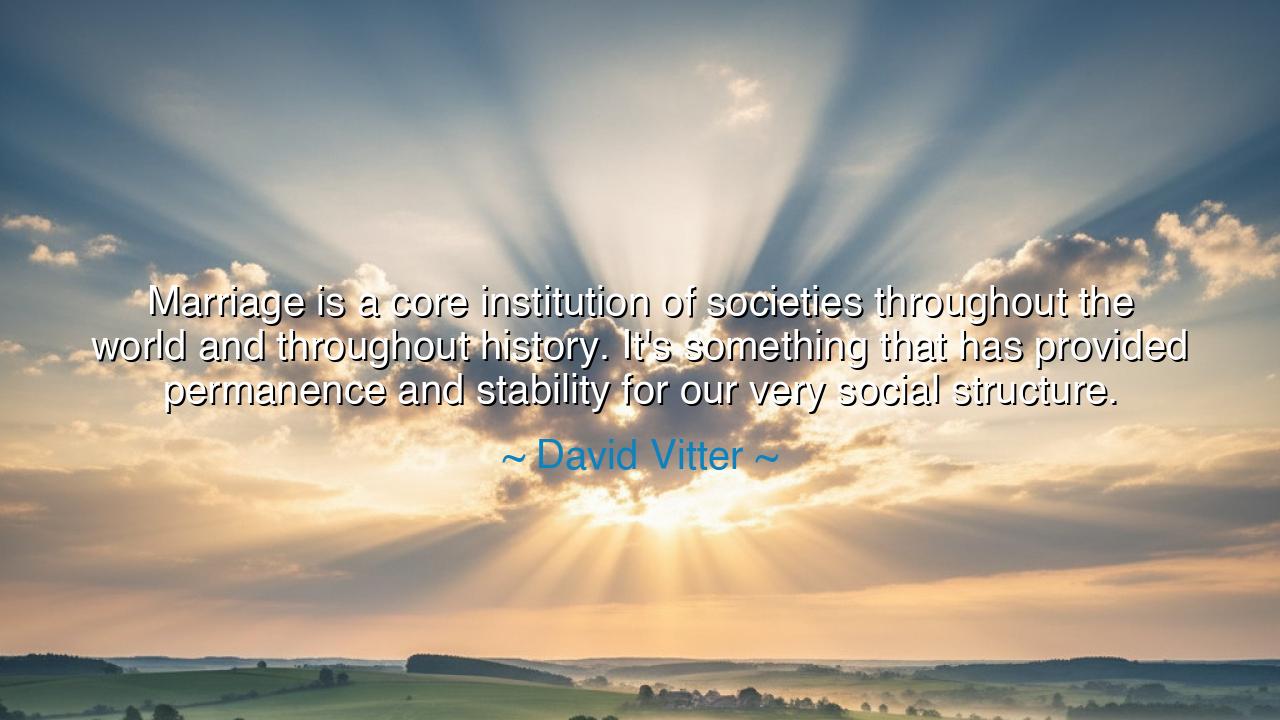
Marriage is a core institution of societies throughout the world
Marriage is a core institution of societies throughout the world and throughout history. It's something that has provided permanence and stability for our very social structure.






"Marriage is a core institution of societies throughout the world and throughout history. It's something that has provided permanence and stability for our very social structure." These words, spoken by David Vitter, echo a truth that resonates deeply through the ages. Marriage, as an institution, is more than just a personal union between two people; it is the very foundation upon which societies have been built. From the earliest civilizations to the modern world, marriage has been the bedrock of social stability, providing the framework through which families are formed, communities are strengthened, and cultures are passed down through the generations.
From the rise of the ancient Egyptians to the flourishing of the Greek and Roman empires, marriage was not just a personal choice—it was a societal necessity. In Egypt, where the union between Osiris and Isis symbolized eternal commitment, marriage was seen as a reflection of divine order. The gods themselves were married, and in their union, they brought about creation and the balance of the world. Similarly, in Rome, marriage was not merely about love or companionship; it was a social contract, one that defined the roles of men and women, and in doing so, helped maintain the structure of Roman society. Marriage was the foundation upon which the Roman family stood, and through the stability of family life, the empire itself found its strength.
In many ways, David Vitter’s words call us back to these ancient truths. When he speaks of marriage as providing permanence and stability, he is referring to a universal truth that stretches across time and cultures. Just as the great empires of history depended on the strength of the family unit, so too do modern societies. The bond of marriage is the link that holds families together, ensuring that future generations are nurtured, that traditions are passed down, and that communities remain intact. It is the glue that binds individuals together and provides a sense of continuity and belonging, a force of stability in a world often marked by change.
Yet, as the ancients knew well, the power of marriage is not just in its social utility, but in its sacred nature. Consider the story of Cleopatra and Julius Caesar, whose marriage united the might of Rome with the powerful kingdom of Egypt. Their union, though politically motivated, was a demonstration of how marriage could transcend the boundaries of nations, forging alliances and creating stability in a turbulent world. Even as their relationship was marked by political ambition and personal passion, it was a reminder that marriage holds the potential for both personal and societal transformation. Through marriage, empires and families alike are bound to one another, creating a web of interconnected lives that shapes the world.
In more recent history, we find similar examples of marriage serving as the cornerstone of society. Take the example of Queen Victoria and Prince Albert of England, whose union was not only one of deep affection but also one that solidified the British monarchy and helped stabilize the vast empire they ruled. Their marriage was the foundation upon which the next generations of royal heirs would be built, and their legacy continued to shape the trajectory of history long after their passing. Their commitment to each other and to their responsibilities as monarchs underscored the stability that marriage can bring, both personally and politically.
Yet, marriage is not merely the union of two individuals, nor is it just a social contract. It is the embodiment of commitment, the cornerstone upon which society is built. The very act of choosing another person to share one’s life is an act of profound significance, for it is a promise that echoes through the ages. Marriage teaches us the values of loyalty, sacrifice, and responsibility—values that are essential not only to personal happiness but to the well-being of society at large. When people come together in marriage, they do so not only for their own fulfillment but for the benefit of their communities, for in their union lies the potential for stability, for growth, and for the continued flourishing of civilization itself.
And so, the lesson we draw from Vitter’s words is one of deep wisdom. Marriage is more than a personal choice; it is the foundation of society, a timeless institution that provides the stability upon which the future is built. Just as the ancient empires flourished through the strength of their family units, so too must we honor the institution of marriage in our own time. We must understand its power, its role in shaping society, and its importance in ensuring that the future remains strong and prosperous. Marriage is not merely the joining of two people—it is the joining of hearts, minds, and futures, woven together in the tapestry of history, creating a legacy of stability, love, and enduring connection.
Let us then take this lesson to heart. In a world where many forces seek to fragment our society, let us cherish the institution of marriage as the bedrock of social stability. Let us work to strengthen the bonds between families, for in doing so, we strengthen the very foundation of the world we live in. And in our own marriages, let us remember that our commitment to one another is not only a personal vow but a contribution to the enduring strength of our communities, our nations, and our world. Through marriage, we find the key to building a future that is rooted in love, loyalty, and stability, ensuring that the generations to come will inherit a world grounded in these timeless values.






AAdministratorAdministrator
Welcome, honored guests. Please leave a comment, we will respond soon